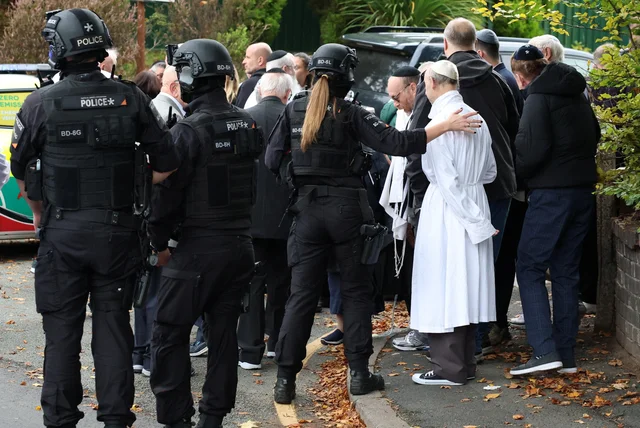While Europe feigns surprise, blood has once again been spilled on British soil—this time during Yom Kippur, in front of a Manchester synagogue. Two dead, four seriously injured, one assailant shot dead. All within ten minutes. Authorities have labeled it a “terrorist attack,” yet the incident reveals not only persistent security failures but also a political denial of warning signs that have long been visible.
A Targeted Attack on the Holiest Day of the Jewish Calendar
On Thursday, October 2nd, 2025, at 9:30 a.m., a car rammed into worshippers gathered outside the Heaton Park Hebrew Congregation synagogue in Crumpsall, north Manchester. A witness reported that the attacker then stabbed people randomly.
Armed police responded within seven minutes. The attacker was shot and killed. He carried “suspicious objects” on him, potentially explosive. A bomb squad was dispatched.
Three dead, according to the latest police update—including the assailant. Two individuals were arrested. London’s anti-terror unit has taken over the investigation. Nothing yet on the suspects’ profiles—another indication that naming ideological motives has become politically inconvenient.
Starmer Returns Home, Balancing Act in Language
Prime Minister Keir Starmer, attending the European Political Community summit in Copenhagen, cut his trip short. He expressed being “horrified” and announced “additional police resources” to protect synagogues across the UK.
But the tone remained measured—almost anesthetized. London authorities insisted that “no increased threat” was detected. The same scripted statements. The same omissions.
A Tense Climate, a Convenient Amnesia
The attack occurred on Yom Kippur, the holiest day in Judaism. A symbolically charged target. It also came just days before the second anniversary of the October 7th, 2023 Hamas massacre in southern Israel, which killed over 1,200 civilians.
Since then, Israel’s military response in Gaza has led to more than 66,000 deaths, according to figures from Hamas’ health ministry—figures considered reliable by the UN. In an emotional and diplomatically paralyzed climate, these massive numbers have served as rhetorical fuel for Islamist movements within Europe, stoking latent resentments.
To call this a coincidence would be naïve.
Terror Attack in Manchester: A Symptom, Not an Isolated Incident
The United Kingdom—one of the most surveilled states in Europe—once again demonstrates its inability to anticipate ideological violence. The terror attack in Manchester highlights how political will to confront Islamic radicalization remains paralyzed by multicultural taboos.
The assailants’ profiles will no doubt be examined in detail, but the authorities’ predictable silence about their ideological motives is already deafening.
Shots were fired. Lives were lost. But were there warnings? The answer is likely yes, ignored.
Another Warning, Willfully Ignored
This attack—by its timing, its location, and its symbolic weight—fits within a larger chronology that British diplomacy remains determined to decontextualize. Public outrage will soon give way to prepackaged statements. Meanwhile, Europe’s societal rifts widen—under the cover of institutional denial and moral relativism.



